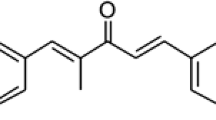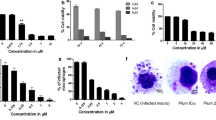Abstract
The role of heat shock protein 90 inhibitor geldanamycin (GA) during Leishmania donovani promastigote-to-amastigote transformation in axenic conditions was investigated. Promastigotes exhibited apoptotic morphologic changes after GA treatment at a high temperature, and the effect is in a dose- and time-dependant manner. Meanwhile, cell cycle analysis showed a significant increase at the expense of cells in the G0/G1 phase and a decrease in the S and G2/M phases after GA treatment. In addition, cellular glutathione level was reduced and reactive oxygen species content was increased afterwards. Pretreatment with antioxidants reduced the percentage of GA-induced cell apoptosis. After treatment, cultures in pH 5.5 showed a lower percentage of apoptosis than those in pH 7.4. The present study showed that GA could cause apoptosis in L. donovani but could not cause stage differentiation in high temperature and that acidic conditions were likely to be crucial for the transformation and survival of the parasite within its human host.









Similar content being viewed by others
References
Alexander J, Vickerman K (1975) Fusion of host cell secondary lysosomes with the parasitophorous vacuoles of Leishmania mexicana-infected macrophages. J Protozoo 22:502–508
Alzate JF, Arias AA, Moreno-Mateos D, Alvarez-Barrientos A, Jiménez-Ruiz A (2007) Mitochondrial superoxide mediates heat-induced apoptotic-like death in Leishmania infantum. Mol Biochem Parasitol 152:192–202
Brandau S, Dresel A, Clos J (1995) High constitutive levels of heat-shock proteins in human-pathogenic parasites of the genus Leishmania. Biochem J 310:225–232
Buchner J (1999) Hsp90 & Co.—a holding for folding. Trends Biochem Sci 4:136–141
Chang KP, Dwyer DM (1976) Multiplication of a human parasite (Leishmania donovani) in phagolysosomes of hamster macrophages in vitro. Science 193:678–680
Clos J, Brandau S, Hoyer C (1998) Chemical stress does not induce heat shock protein synthesis in Leishmania donovani. Protist 149:167–172
Das R, Roy A, Dutta N, Majumder HK (2008) Reactive oxygen species and imbalance of calcium homeostasis contributes to curcumin induced programmed cell death in Leishmania donovani. Apoptosis 13:867–882
Debrabant A, Joshi MB, Pimenta PF, Dwyer DM (2004) Generation of Leishmania donovani axenic amastigotes: their growth and biological characteristics. Int J Parasitol 34:205–217
Graefe SE, Wiesgigl M, Gaworski I, Macdonald A, Clos J (2002) Inhibition of HSP90 in Trypanosoma cruzi induces a stress response but no stage differentiation. Eukaryot Cell 1:936–943
Hengartner MO (2000) The biochemistry of apoptosis. Nature 407:770–776
Luque-Ortega JR, Rivero-Lezcano OM, Croft SL, Rivas L (2001) In vivo monitoring of intracellular ATP levels in Leishmania donovani promastigotes as a rapid method to screen drugs targeting bioenergetic metabolism. Antimicrob Agents Chemother 45:1121–1125
Mehta A, Shaha C (2004) Apoptotic death in Leishmania donovani promastigotes in response to respiratory chain inhibition: complex II inhibition results in increased pentamidine cytotoxicity. J Biol Chem 279:11798–11813
Mukherjee SB, Das M, Sudhandiran G, Shaha C (2002) Increase in cytosolic Ca2+ levels through the activation of non-selective cation channels induced by oxidative stress causes mitochondrial depolarization leading to apoptosis-like death in Leishmania donovani promastigotes. J Biol Chem 277:24717–24727
Pratt WB (1998) The hsp90-based chaperone system: involvement in signal transduction from a variety of hormone and growth factor receptors. Proc Soc Exp Biol Med 217:420–434
Raina P, Kaur S (2006) Chronic heat-shock treatment driven differentiation induces apoptosis in Leishmania donovani. Mol Cell Biochem 289:83–90
Rioux JA, Killick-Kendrick R, Leaney AJ, Young CJ, Turner DP, Lanotte G, Bailly M (1979) Ecology of leishmaniasis in the south of France. 11. Canine leishmaniasis: successful experimental transmission from dog to dog by the bite of Phlebotomus ariasi Tonnoir 1921 (author's transl). Ann Parasitol Hum Comp 54:401–407
Sakagami M, Morrison P, Welch WJ (1999) Benzoquinoid ansamycins (herbimycin A and geldanamycin) interfere with the maturation of growth factor receptor tyrosine kinases. Cell Stress Chaperones 4:19–28
Tian YY, An LJ, Jiang L, Duan YL, Chen J, Jiang B (2006) Catalpol protects dopaminergic neurons from LPS-induced neurotoxicity in mesencephalic neuron–glia cultures. Life Sci 23:193–199
Verma NK, Singh G, Dey CS (2007) Miltefosine induces apoptosis in arsenite-resistant Leishmania donovani promastigotes through mitochondrial dysfunction. Exp Parasitol 116:1–13
Wiesgigl M, Clos J (2001a) Heat shock protein 90 homeostasis controls stage differentiation in Leishmania donovani. Mol Biol Cell 12:3307–3316
Wiesgigl M, Clos J (2001b) The heat shock protein 90 of Leishmania donovani. Med Microbiol Immunol 190:27–31
Acknowledgements
The authors wish to acknowledge the financial support from the Shanghai Leading Academic Discipline Project (B205) and the National Key Basic Research Program (2009CB941704).
Author information
Authors and Affiliations
Corresponding author
Rights and permissions
About this article
Cite this article
Li, Q., Zhou, Y., Yao, C. et al. Apoptosis caused by Hsp90 inhibitor geldanamycin in Leishmania donovani during promastigote-to-amastigote transformation stage. Parasitol Res 105, 1539–1548 (2009). https://doi.org/10.1007/s00436-009-1582-y
Received:
Accepted:
Published:
Issue Date:
DOI: https://doi.org/10.1007/s00436-009-1582-y




